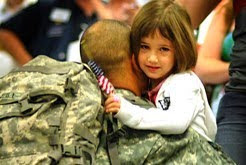In an article titled, "The Depressed Child," the American Academy of Child and Adolescent Psychiatry says that our kids can get depression and that stress and loss can increase the chances of having childhood depression. So what does this mean for our military kids? Our kids that are facing one or both of their parents leaving for a year or more at a time, and then that parent coming home for a short period and going again. Or even worse, never returning.
So when a friend called me and discussed that her wonderful six-year-old daughter has been diagnosed with clinical depression, I wondered, “How could she not?” This sweet little girl has had the love of her life ripped from her over and over again. Her dad has been away with three deployments and year long school totaling 80% of her life. Her mom fights depression herself and is trying to do her best to get them through another deployment.
This little girl kicks and screams and completely shuts down. She bottles up her emotions and refuses to cry. She wants to be strong and she doesn’t want to disappoint her family. She turns to repeating the same phrase over and over again to comfort herself or to hide. This loving little girl internalizes everything because she doesn’t have the ability to say what she needs. Her mom is fighting to relieve her stress and all the pressure placed on her little soul. All she wants is her dad and that is the one thing her mom cannot produce for her.
I listen to their frustration and I cry for them, but being so far away I don’t know what to do but listen. I hear my friend’s fear and I worry about her husband’s reaction and how this will eat at him. I allow them to let me have it to let loose all their worry, and I know that this is all I can do. I listen.
They are doing the right things and it is a fight. They have her in counseling and they are finding ways for her to have control of her situation. They are giving her a safe supportive place for her to feel whatever she is feeling. She is going to be OK but what about all the children that are not getting diagnosed?
Here are some signs to look for. If one or more of these signs of depression persist, parents should seek help:
• Frequent sadness, tearfulness, crying
• Decreased interest in activities; or inability to enjoy previously favorite activities
• Hopelessness
• Persistent boredom; low energy
• Social isolation, poor communication
• Low self esteem and guilt
• Extreme sensitivity to rejection or failure
• Increased irritability, anger, or hostility
• Difficulty with relationships
• Frequent complaints of physical illnesses such as headaches and stomachaches
• Frequent absences from school or poor performance in school
• Poor concentration
• A major change in eating and/or sleeping patterns
• Talk of or efforts to run away from home
• Thoughts or expressions of suicide or self destructive behavior
Source: "The Depressed Child," The American Academy of Child & Adolescent Psychiatry
Not all of our kids are going to have these issues, but we do need to be aware of the symptoms. There is nothing scarier then not being able to help our kids.
~ Courtesy "Her War, Her Voice" blog
For more information, see Army Well-Being: Behavioral Health.
















3 comments:
Huge THANK YOU to Christina for sharing this important information. During "Month of the Military Child," we're glad to focus on our kids, but this is so important to watch for all the time. Thanks, Christina, for the reminder to keep our eyes and ears open for any possible issues with our Army kids. We appreciate you!
It breaks my heart to hear about our little ones having such a hard time as they too face the internal battles that so much time apart causes. But, like you said, how can they not? Our family is currently in our second deployment together (my husband's third total) but this is the first that our son comprehends Daddy being gone. He is 4 years old now, and has a very close relationship with his father. Fortunately he has adjusted fairly well but I know that another deployment in his life is inevitable and I wonder how he will react with the next one when he is even more aware.
Thank you so much for this reminder that it's not only the spouses who are at risk of depression from prolonged separation, these precious children need and deserve just as much attention in these areas.
Thanks, Christina, for this post. I have watched my two sons through three deployments and always wonder what the long-term effect of these separations might do to them. They love their dad, they're proud of him, and they really love the Army life (they already want to move to a 'new adventure') but the separation is hard and it's a good reminder to keep a look out for these symptoms. Thank you!!
Post a Comment